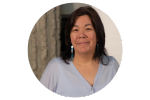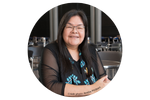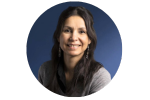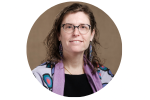
SCIENTIFIC COMMITTEE
 Julie ROCK, Katshishkutamatshesht | Professor of Indigenous Realities and Social Intervention in the Department of Psychoeducation and Social Work at the Université du Québec à Trois-Rivières (UQTR), and Doctoral Candidate in Education, UQ Network—UQAC. Her thesis project focuses on the study of cultural safety practices to support school retention and success of Indigenous students in a vocational training program, First Nations component.
Julie ROCK, Katshishkutamatshesht | Professor of Indigenous Realities and Social Intervention in the Department of Psychoeducation and Social Work at the Université du Québec à Trois-Rivières (UQTR), and Doctoral Candidate in Education, UQ Network—UQAC. Her thesis project focuses on the study of cultural safety practices to support school retention and success of Indigenous students in a vocational training program, First Nations component.
 Sükran Tipi is a doctoral researcher in linguistic anthropology in the Anthropology Department at Université Laval. Passionate about Indigenous languages and the knowledge systems they contain, Şükran Tipi is particularly interested in the linguistic expression of the multidimensional relationship of Indigenous groups with the territory. Involved until recently as a professional in the accompaniment of Indigenous students, first at theCentre des Premières Nations Nikaniteand then at the UQO Indigenous Liaison Office, she takes an experiential look at the ontological and epistemological challenges of the decolonization of post-secondary education environments.
Sükran Tipi is a doctoral researcher in linguistic anthropology in the Anthropology Department at Université Laval. Passionate about Indigenous languages and the knowledge systems they contain, Şükran Tipi is particularly interested in the linguistic expression of the multidimensional relationship of Indigenous groups with the territory. Involved until recently as a professional in the accompaniment of Indigenous students, first at theCentre des Premières Nations Nikaniteand then at the UQO Indigenous Liaison Office, she takes an experiential look at the ontological and epistemological challenges of the decolonization of post-secondary education environments.
 Laurent Jérôme is an anthropologist and professor in the Department of Religious Sciences at Université du Québec à Montréal (UQAM). He is interested in the processes of transmission of knowledge in Indigenous settings in Quebec and Brazil. He is co-director of the Matakan Project. TheÉcole de la forêt, the forest at school with Sakay Ottawa, Principal of the Otapi School, in Manawan.
Laurent Jérôme is an anthropologist and professor in the Department of Religious Sciences at Université du Québec à Montréal (UQAM). He is interested in the processes of transmission of knowledge in Indigenous settings in Quebec and Brazil. He is co-director of the Matakan Project. TheÉcole de la forêt, the forest at school with Sakay Ottawa, Principal of the Otapi School, in Manawan.

Jessie Lepage is a Master of Education student and a lecturer at Université de Sherbrooke. Pekuakamiulnuatsh from Mashteuiatsh, she has made it her personal mission to actively participate in the decolonization of education, health, and social services environments through various conferences in different organizations. For over five years, she has also fulfilled this mission by teaching at Université de Sherbrooke in the Faculties of Education and Sciences, Humanities, and Arts. She has taught courses such as Perspectives autochtones en éducation and Introduction aux enjeux autochtones contemporains. Her research project is focused on the academic careers of groups of indigenous students in vocational training relocated to indigenous communities. She is also interested in cultural security and indigenous pedagogy.
 Yvette Mollen is from the Innu community of Ekuanitshit (Mingan), on Côte-Nord. She has devoted her career to the protection and promotion of her mother tongue, Innu, first as an elementary school teacher, then as director of the “Language and Culture” sector of the Institut Tshakapesh, and through her involvement in the creation of various educational tools. Her greatest ambition: to ensure the survival of Innu-Aimun by fostering interest, both among young Innu and non-Indigenous alike, this descriptive language with its rich and complex vocabulary. Since June 2022, she has been an associate professor at the University of Montréal’s Department of Linguistics and Translation, where she teaches Innu language.
Yvette Mollen is from the Innu community of Ekuanitshit (Mingan), on Côte-Nord. She has devoted her career to the protection and promotion of her mother tongue, Innu, first as an elementary school teacher, then as director of the “Language and Culture” sector of the Institut Tshakapesh, and through her involvement in the creation of various educational tools. Her greatest ambition: to ensure the survival of Innu-Aimun by fostering interest, both among young Innu and non-Indigenous alike, this descriptive language with its rich and complex vocabulary. Since June 2022, she has been an associate professor at the University of Montréal’s Department of Linguistics and Translation, where she teaches Innu language.
 Nicole Audy, now retired, spent 31 years with the Attikamek Nation Council in Education and in program design. For a dozen years, she held the position of Interim Director of Educational, Linguistic and Cultural Services for the Atikamekw. In particular, she supervised the Bachelor of Education project for the Atikamekw of Wemotaci and Manawan, with 17 graduates of the program now employed in Wemotaci and Manawan elementary schools. She participated in the first edition of the PAAFP Convention in 2014 · She was a member of the Pedagogical Council of the Centre Nikanite of UQAC for about ten years and is part of the project uniting Université Laval, Université de Sherbrooke, and UQTR for the training of university teachers in teaching. Following this collaboration, the documentReconnaître et valoriser les langues autochtones (Recognizing and Valuing Indigenous Languages) (2021) was produced by the UQTR team (Corina Borri-Anadon, Karine Gélinas, Eve Lemaire and Nicol Audy).
Nicole Audy, now retired, spent 31 years with the Attikamek Nation Council in Education and in program design. For a dozen years, she held the position of Interim Director of Educational, Linguistic and Cultural Services for the Atikamekw. In particular, she supervised the Bachelor of Education project for the Atikamekw of Wemotaci and Manawan, with 17 graduates of the program now employed in Wemotaci and Manawan elementary schools. She participated in the first edition of the PAAFP Convention in 2014 · She was a member of the Pedagogical Council of the Centre Nikanite of UQAC for about ten years and is part of the project uniting Université Laval, Université de Sherbrooke, and UQTR for the training of university teachers in teaching. Following this collaboration, the documentReconnaître et valoriser les langues autochtones (Recognizing and Valuing Indigenous Languages) (2021) was produced by the UQTR team (Corina Borri-Anadon, Karine Gélinas, Eve Lemaire and Nicol Audy).
 Nancy Wiscutie-Crépeau is an assistant professor atInstitut national de la recherche scientifique(INRS) and is attached to the INRS-UQAT Joint Research Unit in Indigenous Studies. She is interested in issues associated with education and the reappropriation of Indigenous languages. Her research is at the core of a decolonial approach.
Nancy Wiscutie-Crépeau is an assistant professor atInstitut national de la recherche scientifique(INRS) and is attached to the INRS-UQAT Joint Research Unit in Indigenous Studies. She is interested in issues associated with education and the reappropriation of Indigenous languages. Her research is at the core of a decolonial approach.

Natasha Blanchet-Cohen is a professor in the Department of Applied Humanities at Concordia University and co-holder of theChaire-réseau de recherche sur la jeunesse de Québec(Indigenous component). For over 25 years, Natasha has been engaged in partnership research to support the expression and commitment of young people. Her approach combines research, intervention, and the co-construction of knowledge. Her research interests revolve around youth agency, as well as young people’s perspectives on education and culturally safe and rights-based services and approaches.
 Christine couture is a professor in the Department of Educational Sciences at the Université du Québec à Chicoutimi (UQAC) and a researcher associated with CRIFPE and the UNESCO CHAIRE in cultural transmission among First Peoples. Using a collaborative research approach, she is working to document the development of practices: for teaching science and technology; to support the success of urban Indigenous students (Projet Petapan 2017-2020, CSS des-Rives-du-Saguenay); and for cultural safety (Action concertée FRQSC 2020-2024). She is continuing this work in a new project (MES 2024-2025) on the mobilization of Indigenous perspectives in teacher training.
Christine couture is a professor in the Department of Educational Sciences at the Université du Québec à Chicoutimi (UQAC) and a researcher associated with CRIFPE and the UNESCO CHAIRE in cultural transmission among First Peoples. Using a collaborative research approach, she is working to document the development of practices: for teaching science and technology; to support the success of urban Indigenous students (Projet Petapan 2017-2020, CSS des-Rives-du-Saguenay); and for cultural safety (Action concertée FRQSC 2020-2024). She is continuing this work in a new project (MES 2024-2025) on the mobilization of Indigenous perspectives in teacher training.
 Constance Lavoie is a full professor in the Faculty of Education at Université de Sherbrooke and a regular researcher at theCentre de recherche sur l’enseignement et l’apprentissage(CREA). She has been working on the inclusion of Indigenous perspectives in language didactics from school to university for 15 years. Her work focuses on the didactic transposition of Indigenous oral heritage in schools. She supported the creation of teaching practicums in Indigenous communities and developed the coursePerspectives autochtones en éducationoffered at Université de Sherbrooke. té de Sherbrooke.
Constance Lavoie is a full professor in the Faculty of Education at Université de Sherbrooke and a regular researcher at theCentre de recherche sur l’enseignement et l’apprentissage(CREA). She has been working on the inclusion of Indigenous perspectives in language didactics from school to university for 15 years. Her work focuses on the didactic transposition of Indigenous oral heritage in schools. She supported the creation of teaching practicums in Indigenous communities and developed the coursePerspectives autochtones en éducationoffered at Université de Sherbrooke. té de Sherbrooke.
 Jean-Luc Ratel is research professional and lecturer in theFondations et practices en éducationDepartment at Université Laval. As such, he covers topics such as indigenous education, the sociology of education, inclusive education, and qualitative methodology. He is involved in several collaborative research projects in Indigenous communities in Quebec and Nunavut, including projects on educational success and post-secondary education among the Inuit, history teaching and the transition to post-secondary education among the Naskapi, and language teaching among the Innu. He has also published a number of articles in connection with these projects and co-edited the second edition of the collective workLa diversité ethnoculturelle, religieuse et linguistique en éducation: théorie et pratique, published by Fides. rojets et codirigé la deuxième édition de l’ouvrage collectifLa diversité ethnoculturelle, religieuse et linguistique en éducation : théorie et pratique, chez Fides.
Jean-Luc Ratel is research professional and lecturer in theFondations et practices en éducationDepartment at Université Laval. As such, he covers topics such as indigenous education, the sociology of education, inclusive education, and qualitative methodology. He is involved in several collaborative research projects in Indigenous communities in Quebec and Nunavut, including projects on educational success and post-secondary education among the Inuit, history teaching and the transition to post-secondary education among the Naskapi, and language teaching among the Innu. He has also published a number of articles in connection with these projects and co-edited the second edition of the collective workLa diversité ethnoculturelle, religieuse et linguistique en éducation: théorie et pratique, published by Fides. rojets et codirigé la deuxième édition de l’ouvrage collectifLa diversité ethnoculturelle, religieuse et linguistique en éducation : théorie et pratique, chez Fides.
 Julie Vaudrin-Charette holds a doctorate in education and is an advocate for deep learning and Indigenous languages in reconciliation pedagogies. She is currently an advisor to theDirection des relations avec les Premières Nations et les Inuitsofministère de l’Enseignement supérieur du Québec. She is also a proponent of decolonization and equity practices in collegiate settings, a/r/tographer, and mother of four developing humans.
Julie Vaudrin-Charette holds a doctorate in education and is an advocate for deep learning and Indigenous languages in reconciliation pedagogies. She is currently an advisor to theDirection des relations avec les Premières Nations et les Inuitsofministère de l’Enseignement supérieur du Québec. She is also a proponent of decolonization and equity practices in collegiate settings, a/r/tographer, and mother of four developing humans.
 Marco Bacon, a member of the Pekuakamiulniuatsh Nation, holds a bachelor’s degree in arts education and a master’s degree in arts (transmission component) from the Université du Québec à Chicoutimi. He worked for several years in the field of education for theConseil des Montagnais du Lac-Saint-Jean. From September 2009 to June 2019, he held the position of Director of theCentre des Premières Nations Nikanite(CPNN) at Université du Québec à Chicoutimi (UQAC), where his main responsibility was to ensure the link between First Nations communities and the university in areas related to teaching and research. He is now Director ofBureau de l’inclusion et de la réussite étudiante, Université du Québec à Montréal (UQAM). Mr. Bacon is actively involved in several initiatives aimed at ensuring quality education for First Nations people, as well as their overall health and well-being, with a view to self-determination.
Marco Bacon, a member of the Pekuakamiulniuatsh Nation, holds a bachelor’s degree in arts education and a master’s degree in arts (transmission component) from the Université du Québec à Chicoutimi. He worked for several years in the field of education for theConseil des Montagnais du Lac-Saint-Jean. From September 2009 to June 2019, he held the position of Director of theCentre des Premières Nations Nikanite(CPNN) at Université du Québec à Chicoutimi (UQAC), where his main responsibility was to ensure the link between First Nations communities and the university in areas related to teaching and research. He is now Director ofBureau de l’inclusion et de la réussite étudiante, Université du Québec à Montréal (UQAM). Mr. Bacon is actively involved in several initiatives aimed at ensuring quality education for First Nations people, as well as their overall health and well-being, with a view to self-determination.
 Boutheina Harbaoui is a research and planification officer with theBureau de l’inclusion et de la réussite étudianteà UQAM. After her doctoral studies, she pursued a ten-year academic career as a teacher-researcher. She has presented conferences and training workshops in the field of Sustainable Development and Corporate Social Responsibility. As part of her current research and planning work, she is involved in the administrative and/or strategic implementation of decolonization, indigenization, and reconciliation initiatives with Indigenous peoples in the university environment.
Boutheina Harbaoui is a research and planification officer with theBureau de l’inclusion et de la réussite étudianteà UQAM. After her doctoral studies, she pursued a ten-year academic career as a teacher-researcher. She has presented conferences and training workshops in the field of Sustainable Development and Corporate Social Responsibility. As part of her current research and planning work, she is involved in the administrative and/or strategic implementation of decolonization, indigenization, and reconciliation initiatives with Indigenous peoples in the university environment.
ORGANIZING COMMITTEE
Marco Bacon, Director, Bureau de l’inclusion et de la réussite étudiante, Université du Québec à Montréal (UQAM)
Mélanie Gleize,Information Officer, Bureau de l’inclusion et de la réussite étudiante, Université du Québec à Montréal (UQAM)
Mélanie Racine, Communications Advisor, Bureau de l’inclusion et de la réussite étudiante, Université du Québec à Montréal (UQAM)
Mirna Abiad-Boyadjian, Information Officer, Bureau de l’inclusion et de la réussite étudiante, Université du Québec à Montréal (UQAM)
Ouiza Outoudert, Executive Secretary, Bureau de l’inclusion et de la réussite étudiante, Université du Québec à Montréal (UQAM)
Livia Vitenti,Reception advisor, Bureau de l’inclusion et de la réussite étudiante, Université du Québec à Montréal (UQAM)
Ginette Tremblay,Translator, Traduction GT